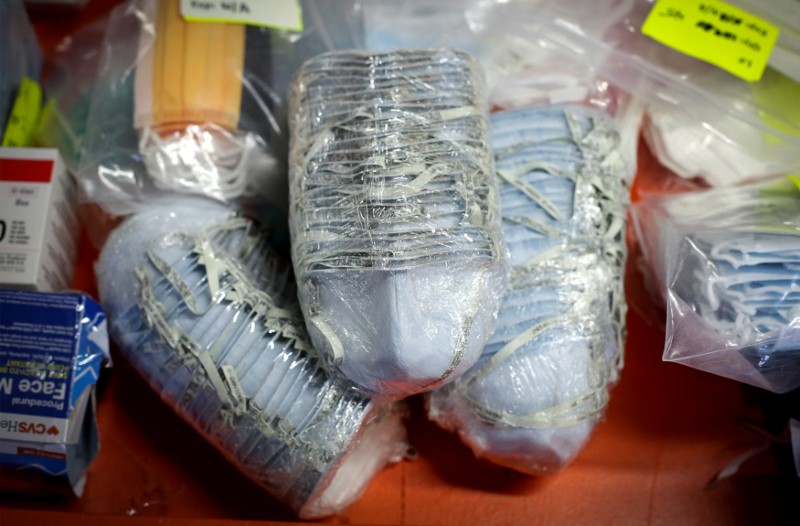By Michael Berens
CHICAGO (Reuters) - Home healthcare providers, the lifelines to 12 million vulnerable Americans, are scrambling to decide how to serve patients who show symptoms of coronavirus -- and how to ensure that the providers themselves neither catch nor spread it.
A Texas-based company operating in 26 states instructed its caregivers to leave the homes of clients who recently traveled from states with “widespread community transmission” or who had contact with anyone screened for coronavirus, regardless of whether that person tested positive, according to an internal directive reviewed by Reuters.
In Ohio, a group representing hundreds of providers warned the governor last week of “a sense of impending doom that things are collapsing.” Companies there said they need financial help and protective gear to continue home care.
And in New York, America’s epicenter of coronavirus cases, trade groups said dozens of caregivers have left their jobs and their patients, hurting efforts to swiftly screen at-risk adults and slow the spread of the virus.
“It’s a hair-on-fire crisis,” said Roger Noyes, spokesman for New York’s Home Care Association.
As hospitals continue to handle an influx of coronavirus cases, patients who need care but are not critically ill are likely to be sent home. If home care providers can’t stay afloat or decline to offer services, those patients will “face a rapid, immediately life-threatening deterioration” of their health, said Al Cardillo, president of the New York group.
Compounding the industry’s financial woes are bidding wars for essential medical equipment, including latex gloves and coveted N95 masks, which provide a higher level of protection than surgical masks. Private companies and public agencies are fighting for limited supplies – and those with the biggest pocketbooks are winning.
During a news conference this week, New York Gov. Andrew Cuomo decried that he was forced to amass basic medical supplies by “bidding up other states on the prices.”
For now, that can leave smaller home health companies at the back of the line, said Emma Dickison, board president of the Home Care Association of America.
“I spent the whole weekend to score new masks,” said Dickison, also executive officer of Cincinnati-based Home Helpers Home Care.
With three weeks’ worth of masks in inventory, her own company, a large franchise operation that serves 1,000 cities and towns, is among the fortunate. Caregivers from a handful of much smaller Ohio home health businesses have no masks or gloves, a trade group representative told Reuters.
“Stop the visit, leave the residence”
In recent weeks, many home health companies have launched safety programs to protect caregivers and patients from coronavirus.
One of the nation’s most comprehensive approaches belongs to Texas-based Addus HomeCare. The company oversees 33,000 employees in 26 states, including Washington and New York – two of the hardest hit by the virus.
Addus caregivers are required to ask clients five questions about emerging or worsening respiratory problems; contacts with other people diagnosed or screened for the virus; and recent domestic and foreign travel.
“In the event that a client answers ‘Yes’ to any of the questions, an alert will be triggered,” according to the directive distributed last week. “You will be instructed to stop the visit, leave the residence, and contact your supervisor immediately.”
In turn, supervisors complete a one-page incident report and notify local health departments in cases of suspected infection.
In most cases, Addus caregivers told Reuters, care is quickly resumed absent clear evidence of respiratory disease. Even in confirmed cases of coronavirus, care may continue if delays would pose potential harm to patients.
Caregivers must answer the same five questions for supervisors at the start of each shift.
Patient screening by home health companies can help detect new viral outbreaks and allow quicker response by public health agencies. However, accuracy relies on the honor system, possibly undermined by caregivers who don’t want to miss a day of work or by patients unwilling to delay care.
“BREAKING POINT”
Joe Russell, executive director for the Ohio Council for Home Care & Hospice, said he knew the letter he sent last week to the state’s governor on behalf of 600 providers would raise alarms.
“I don’t care,” he said. “I’m going to keep yelling until someone pays attention.”
Because of financial challenges tied to coronavirus, many home-care businesses are at a financial “breaking point,” he wrote in the four-page letter. Care programs earmarked for low-income homebound patients are poised to “collapse.” While the need for home care is increasing daily, “our ability to provide these services has decreased.”
He asked Gov. Mike DeWine to waive restrictions prohibiting the use of telehealth services, such as live video conference calls. Remote patient monitoring, or telehealth, is a common time-saving strategy used by hospitals and doctors for nearly a decade. It is subsidized by state and federal reimbursements.
But for the home healthcare industry, government reimbursements generally cover only person-to-person visits to the home.
Although DeWine’s office did not immediately respond to Reuters’ request for comment, Russell said state officials are giving the matter “serious” consideration.
“We’re just sort of in a holding pattern,” he said.
National home health trade groups have pushed government regulators for years to expand use of telehealth services, a plea more pressing today because of COVID-19, the disease caused by the novel coronavirus.
Many home visits are administrative in nature, often involving doctors and nurses who review care plans or query patients on their conditions, Russell said. Approving telehealth options for such visits would reap huge financial savings for home health companies without diminishing quality of care, he said.
“Our problems are not caused by COVID-19,” he said. “Our problems are caused by what the government hasn’t done.”
